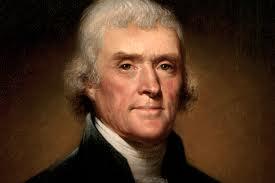
Thomas Jefferson was a well known statesman during the founding of America. Probably more than any we know, he epitomizes the idea of individual and local choice. He promoted “ward republics”. Wikipedia indicates that the concept of hundreds became the colonial idea of wards.
Thomas Jefferson was a well known statesman during the founding of America. Probably more than any we know, he epitomizes the idea of individual and local choice. He promoted “ward republics”. Wikipedia indicates that the concept of hundreds became the colonial idea of wards. Jefferson himself referred to the “Anglo-Saxon” idea of “hundreds”, later naming them “Ward Republics”. In a letter to Sam Kercheval in 1816, Jefferson outlined the need for ‘Ward Republics’. In the book: Thomas Jefferson : Political Writings as quoted from Wikipedia can be found the following, “He proposed to divide the counties into ‘wards of such size as that every citizen can attend, when called on, and act in person … will relieve the county administration of nearly all its business, will have it better done, and by making every citizen an acting member of the government, and in the offices nearest and most interesting to him, will attach him by his strongest feelings to the independence of his country, and its republican constitution.” Thomas Jefferson felt that local political wards (about 500 people) were the very basis for community education for children and political action. In accordance with a moral people that John Adams said was necessary in order to enjoy the fruits of the Constitution, local geographic units of communities were the basis of political thought and action. For example, the local political wards of the Massachusetts area and New England were the cradles of early American political thought and strength resulting in the chain of events and movement leading to the establishment of political freedom.
New England was also a hotbed of local community politics which eventually included the American principles found in the Declaration of Independence and the United States Constitution. The History Channel –online reports: “In the four New England colonies, the town was the primary local unit and was administered by selectmen and other officials elected (usually annually) by a town meeting.” Many of the traditions of the New England communities and Jefferson’s ideas survive today.